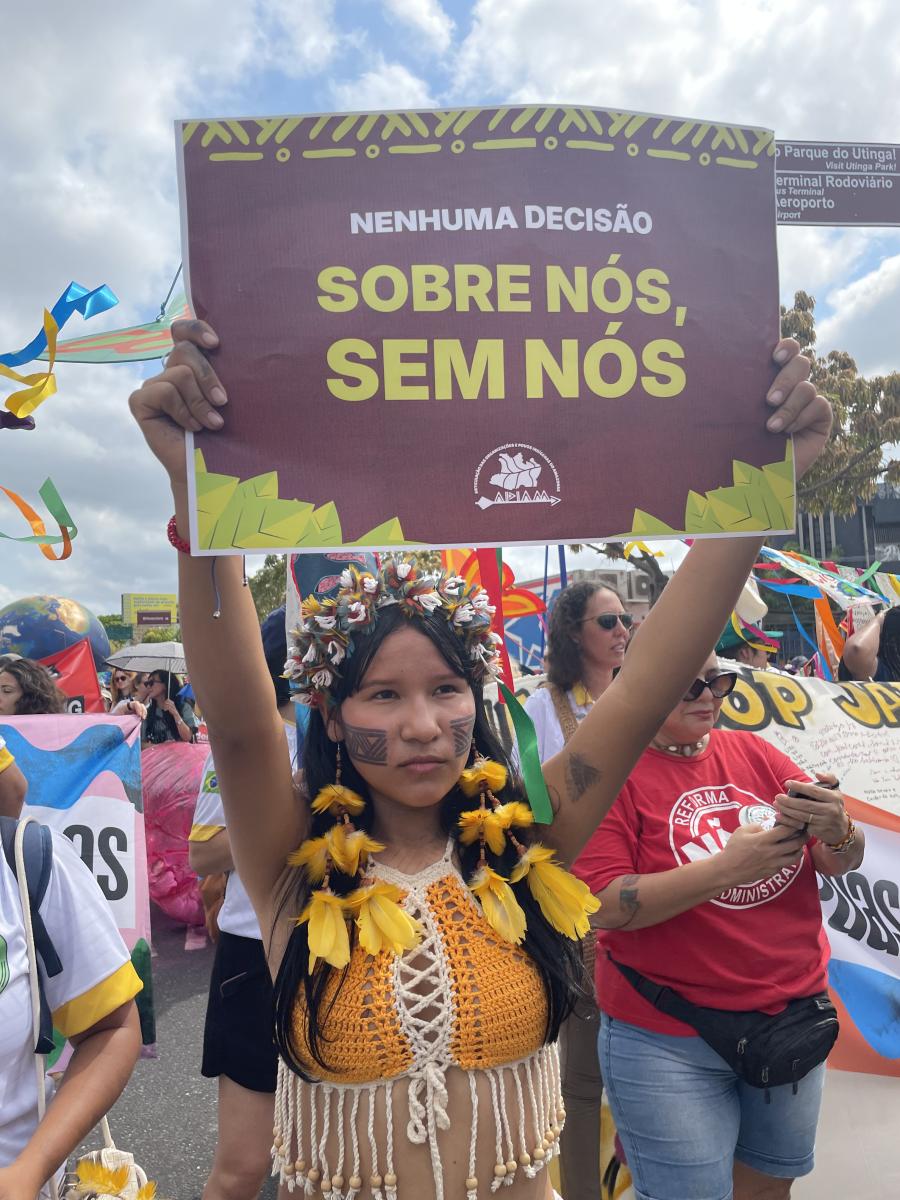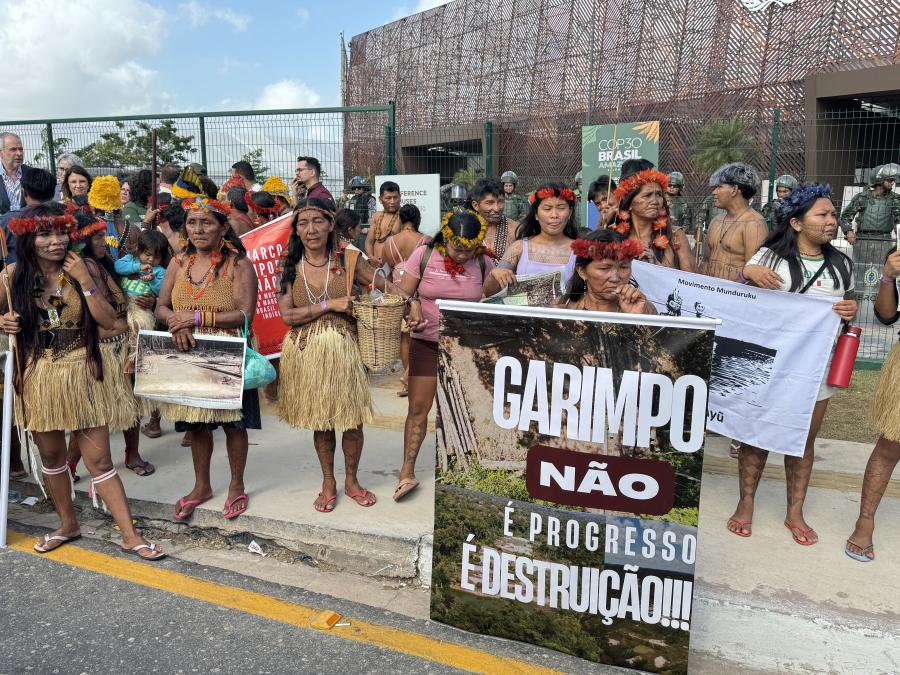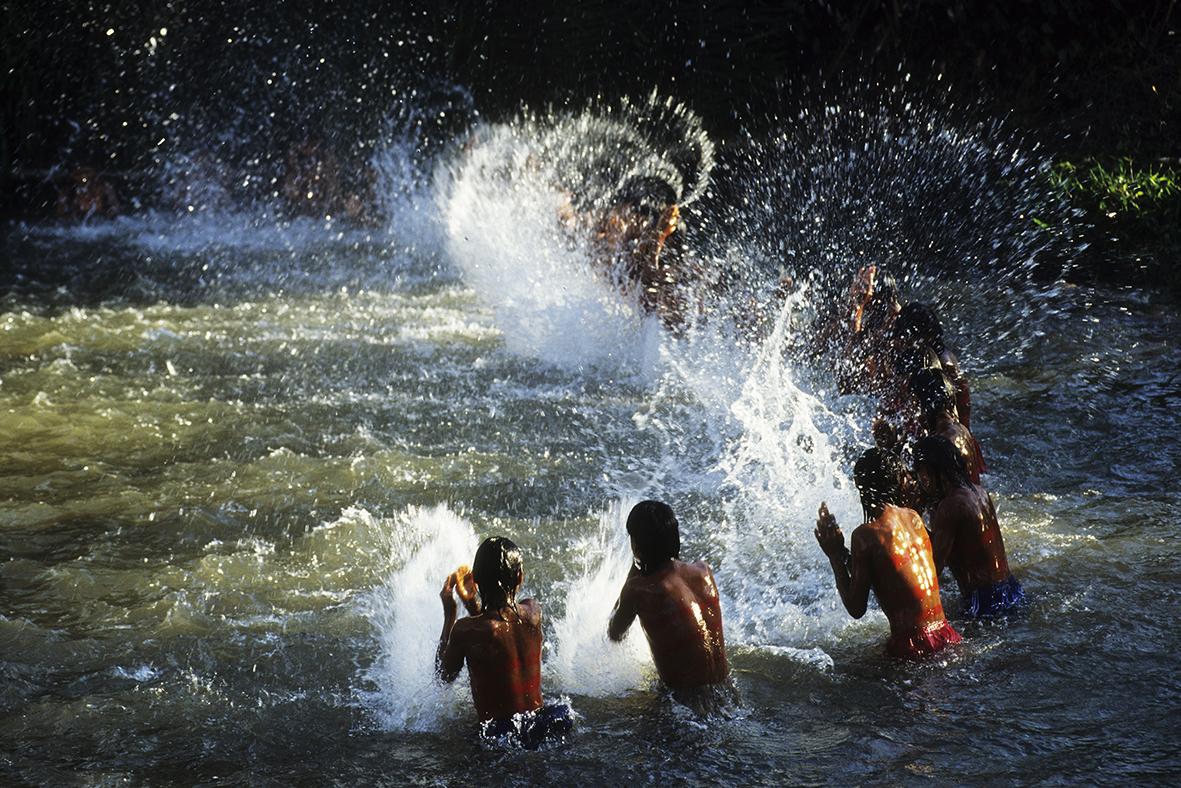
Many A'uwẽ-Xavante ceremonies – such as wate’a (above), part of the male initiation complex -- revolve around water and ritual activities in water. Plans for three hydroelectric dams on tributaries to the Rio das Mortes threaten the river basin. Photo by Rosa Gauditano/Studio R.
By Laura R. Graham, with collaboration from Edson Krenak Naknanuk
A’uwẽ-Xavante leaders from the Xavante Indigenous Territories of São Marcos, Areões, Pimentel Barbosa and Sangradouro denounce the consultation process concerning three hydroelectric dams planned for tributaries to the Rio das Mortes in Brazil’s eastern Mato Grosso state. According to a denunciation issued on March 3, 2020, by A’uwẽ-Xavante leaders (see below), political and business interests are corrupting the consultation process. They are co-opting leaders, excluding representatives of communities to be affected, and seeding division among Indigenous Peoples who inhabit the Rio das Mortes basin. Because a technical detail absurdly defines the affected zone as the very limited area within a 40-kilometer radius of each construction site, only a small group of leaders from a single Xavante Indigenous Territory, Sangradouro (see map), have been summoned to participate in meetings regarding the development of a consultation protocol. This same small group also authorizes companies involved in the dams’ construction to move forward conducting impact studies.
Map courtesy of Laura R. Graham.
In December 2019, FUNAI notified leaders from communities in the westernmost Xavante Indigenous Territory of Sangradouro of the firm Bom Futuro Energy’s plans to construct three small hydroelectric power plants -- Cumbuco, Geologist Lucimar Gomes, and Entre Rios -- on tributaries to the Rio das Mortes. Because these dams will affect four other Indigenous Territories along the Rio das Mortes -- including three additional Xavante Territories (São Marcos, Areões, Pimentel Barbosa) and also the Bororo Territory of Meruri – the denunciation demands that representatives from these Territories also be included in consultations and in developing a culturally meaningful consultation process. Moreover, the authors - who include community leaders and representatives from A’uwẽ-Xavante NGOs - assert that, in order for a consultation protocol to be legitimate, representatives from the firms that have a stake in the construction – and, especially their money – as well as Mato Grosso state representatives who also have a stake in the project, must be excluded from the process.
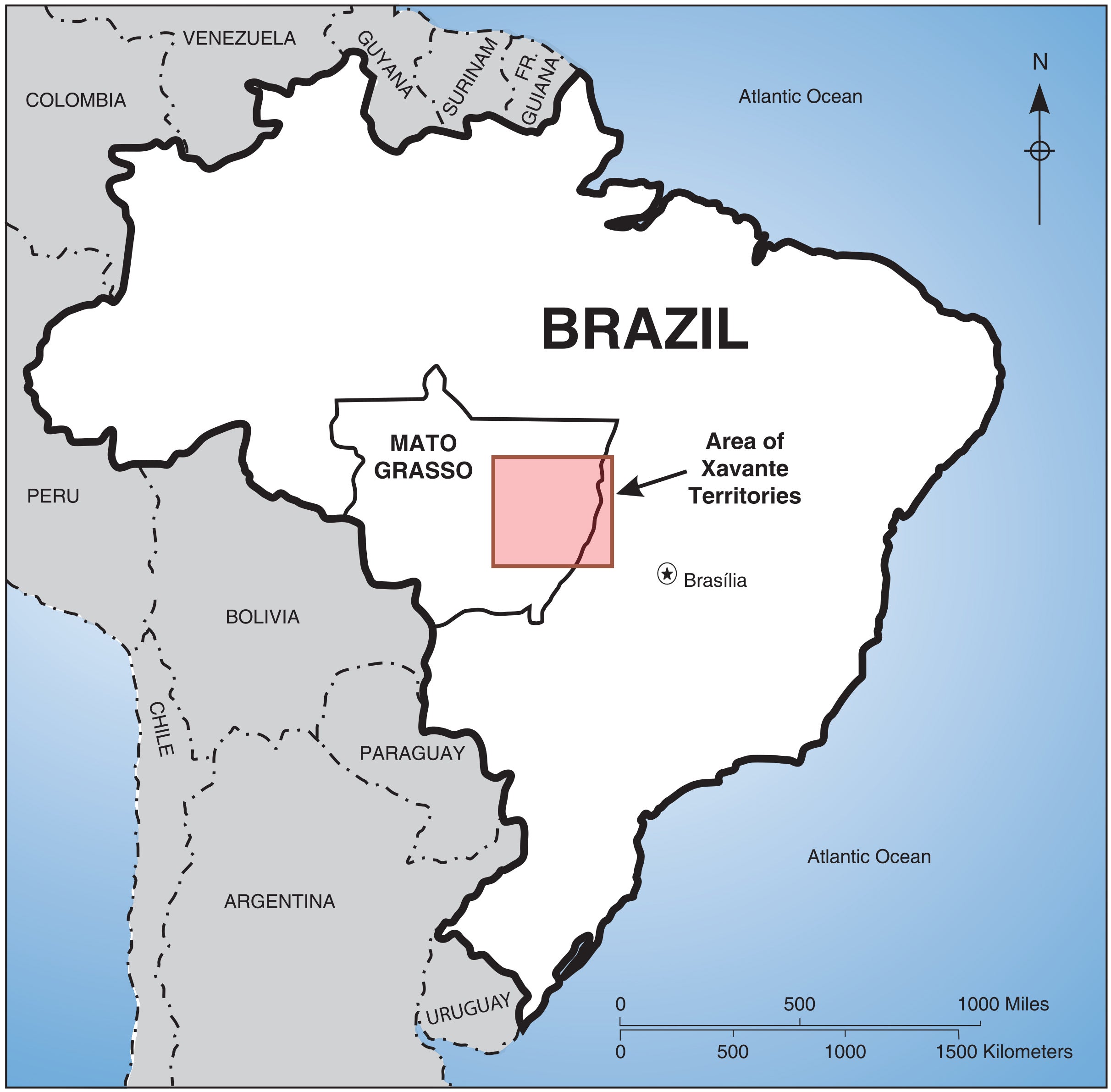
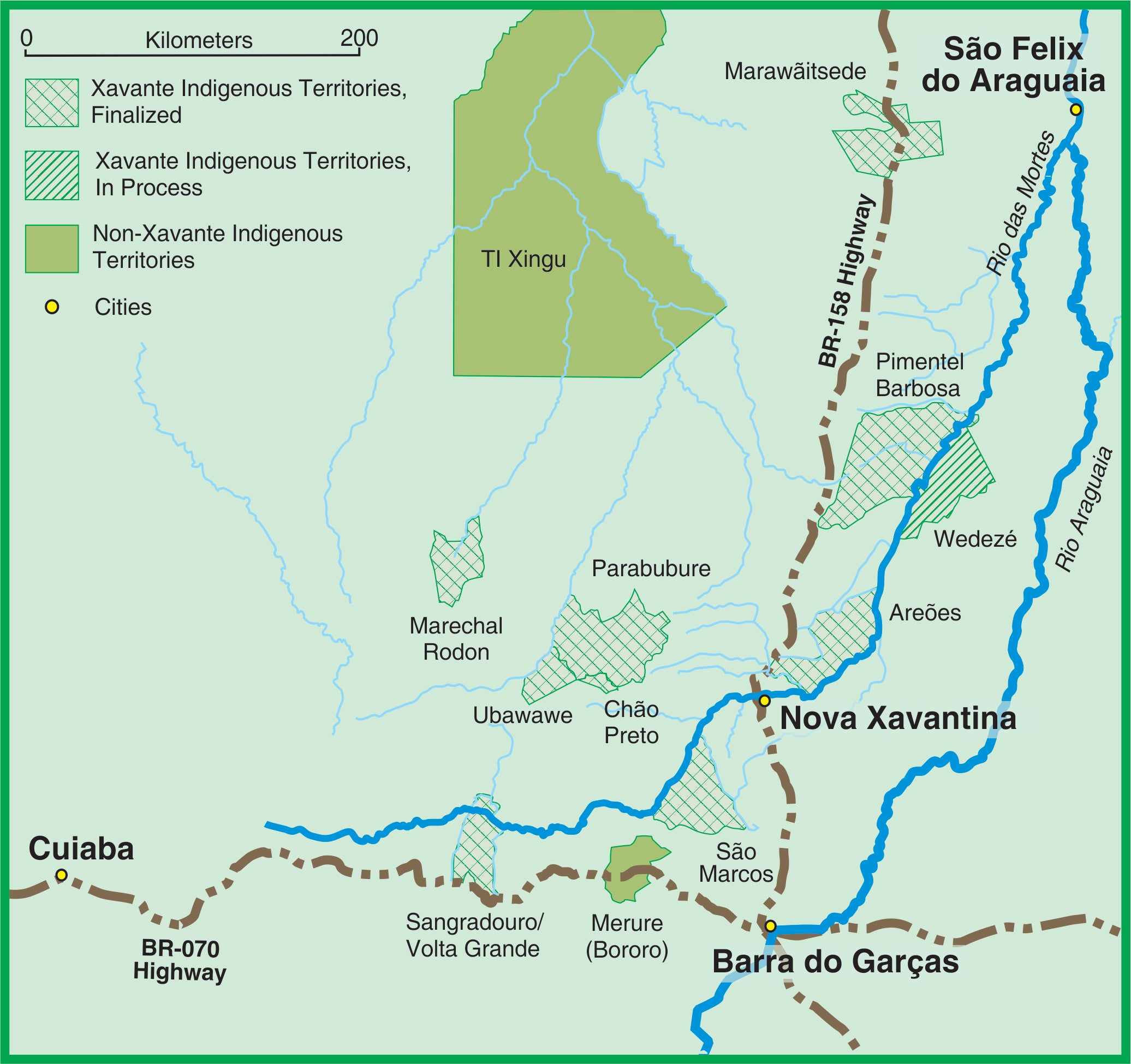
Maps courtesy of Laura R. Graham.
Citing the example of an A’uwẽ-Xavante representative from the Xavante Warã Association (AXW) who was banned from the meetings, the denunciation’s authors accuse the current consultation protocol of exclusionary practice, co-option of leadership, and exacerbating divisions and rivalries among A’uwẽ-Xavante.
In addition to opposing the construction company’s participation in designing the consultation protocol, the authors object to its proceeding with impact studies until representation from all A’uwẽ-Xavante and Boe-Bororo Territories to be affected are included in the consultation process. In their denunciation the leaders underscore that the Rio das Mortes is sacred. The lives and cultures of A’uwẽ-Xavante and Boe-Bororo depend on the river’s vitality as well as on the flora and fauna that are also sustained by a healthy river. For this reason, the leaders demand their right to autonomy and independence in constructing the consultation process (for more on Free, Prior and Informed Consent, see here). See A’uwẽ-Xavante leaders’ denunciation below,
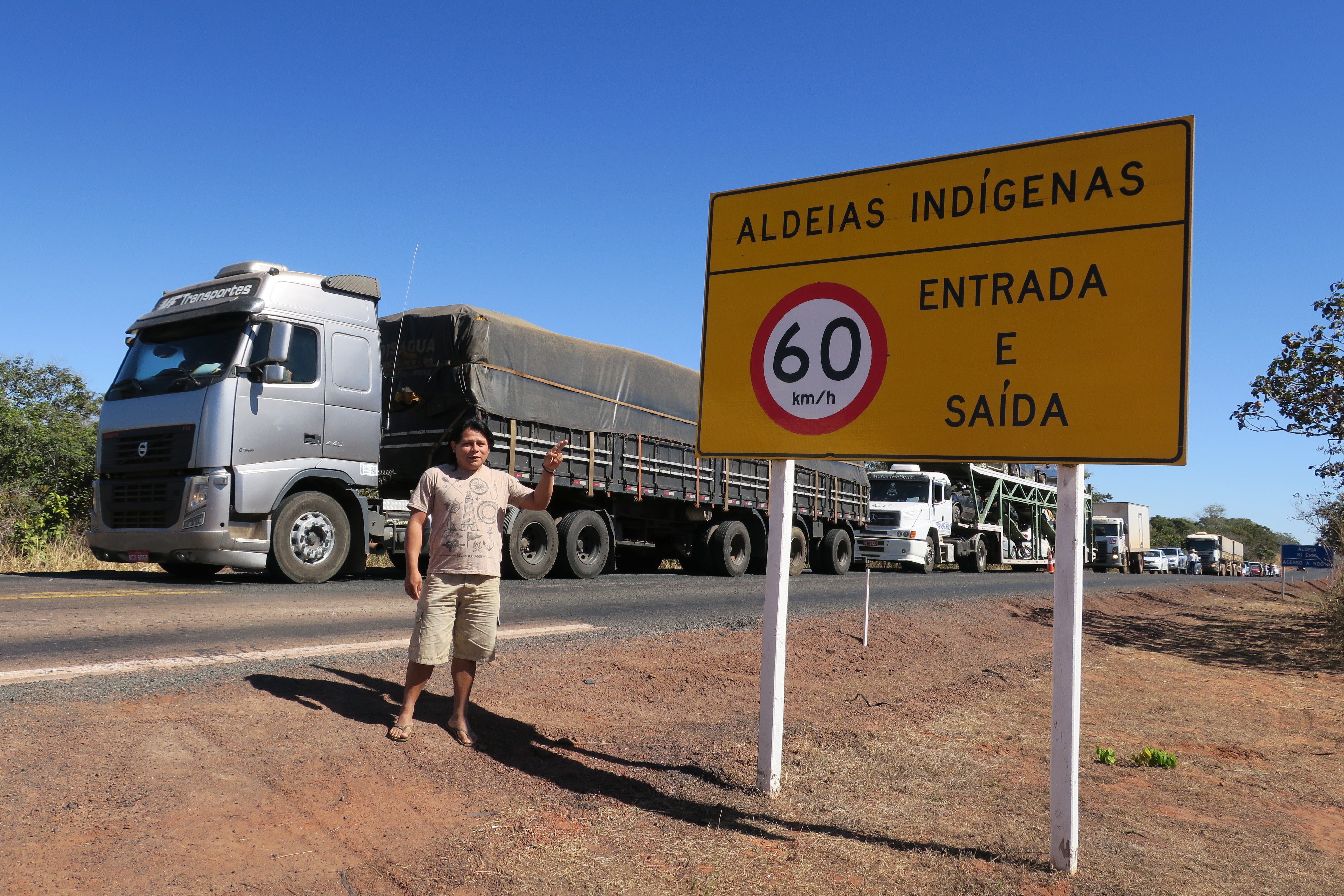
öwa’u and other A’uwẽ-Xavante are concerned that truckers and others who travel heavily trafficked BR-070 and BR-158 highways that traverse A’uwẽ-Xavante and Bororo Territories will bring COVID-19 to A’uwẽ-Xavante. Photo by Laura R. Graham.
While continuing to suffer pressure concerning the implementation of these dams, Boe-Bororo and A’uwẽ-Xavante -- whose territories are located at the epicenter of Brazil’s booming soy region -- are at risk of COVID-19 exposure from traffic along federal highways that run through their territories. The Xavante Warã Association is demanding that Brazil suspend commercial traffic along Federal Highways BR-070 and BR-158 that traverse the Xavante Indigenous Territories of Areões, Marãiwaitsede, Pimentel Barbosa, São Marcos, and Sangradouro, and the Bororo Indigenous Territory Meruri (see AXW letter below). Given population increases since 2014, when the last official demographic data was collected, the population in these areas totals at least 10,000. Hundreds of transport trucks and busses daily travel these highways, potentially exposing thousands of Indigenous inhabitants to contagion. Illegal fishing and hunting poachers, loggers and miners also enter A’uwẽ-Xavante and Boe-Bororo Indigenous Territories via these highways, further increasing Indigenous Peoples’ risk of COVID exposure. A’uwẽ-Xavante and Boe-Bororo also travel these highways to reach towns outside of their reserves where they purchase staple foods. Like many of Brazil’s Indigenous Peoples who began receiving basic food support (cesta basica) through social programs for low income households instituted during the Lula government (2003-2010), they now rely heavily on store-bought food staples. To obtain basic subsistence items, they must travel these dangerous highways which are now even more perilous when the risk of COVID exposure from truckers and other travelers is high. Reports indicate that, as of April 13, Brazil’s Indian Health Service has one confirmed at least one COVID case among A’uwẽ-Xavante.
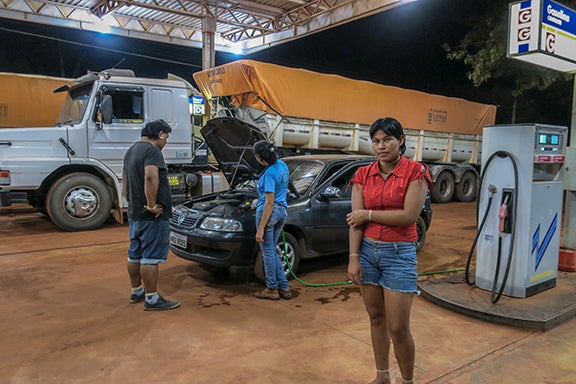
Lidia Xavante from T.I. São Marcos waits at a busy truck stop. A’uwẽ-Xavante risk exposure to COVID-19 from truckers and other travelers along heavily trafficked highways that traverse their territory. Photo by Laura R. Graham.

Residents of the Boe-Bororo community of Meruri, located close to BR-070, risk COVID exposure from commercial traffic along the highway. Photo by Sylvia Caiuby Novaes.
A’uwẽ-Xavante are particularly at risk for COVID-19 because of high rates of diseases that represent significant co-morbidity. Studies indicate that A’uwẽ-Xavante have the highest incidence of diabetes of any ethnic group in Brazil. They also have a high incidence of tuberculosis. Closing highways BR-070 and BR-158 to commercial transport would significantly reduce the potential exposure risk for A’uwẽ-Xavante and Boe-Bororo who live along and travel these heavily trafficked highways. AXW requests support for its work making masks, as well as for food, and medication, to be distributed to A’uwẽ-Xavante communities. (To make a contribution to AXW’s COVID-related work, click here.) Click here to see Cultural Survival’s advocacy letter requesting Brazil suspend traffic along these highways.
In the midst of COVID-19, Brazil continues to advance policies that undermine the rights of the nation’s 305 distinct Indigenous Peoples, who comprise more than 1 million of its citizens. New actions by the Brazilian government not only repeat past injustices but are accelerating threats to the rights and livelihoods of Indigenous people. They also exacerbate negative impacts on the environment, including the cerrado -- home to many unique and threatened flora and fauna species and with fewer legal protections than Amazonia -- where A’uwẽ-Xavante and Boe-Bororo, along with thousands of other Indigenous Peoples, reside.
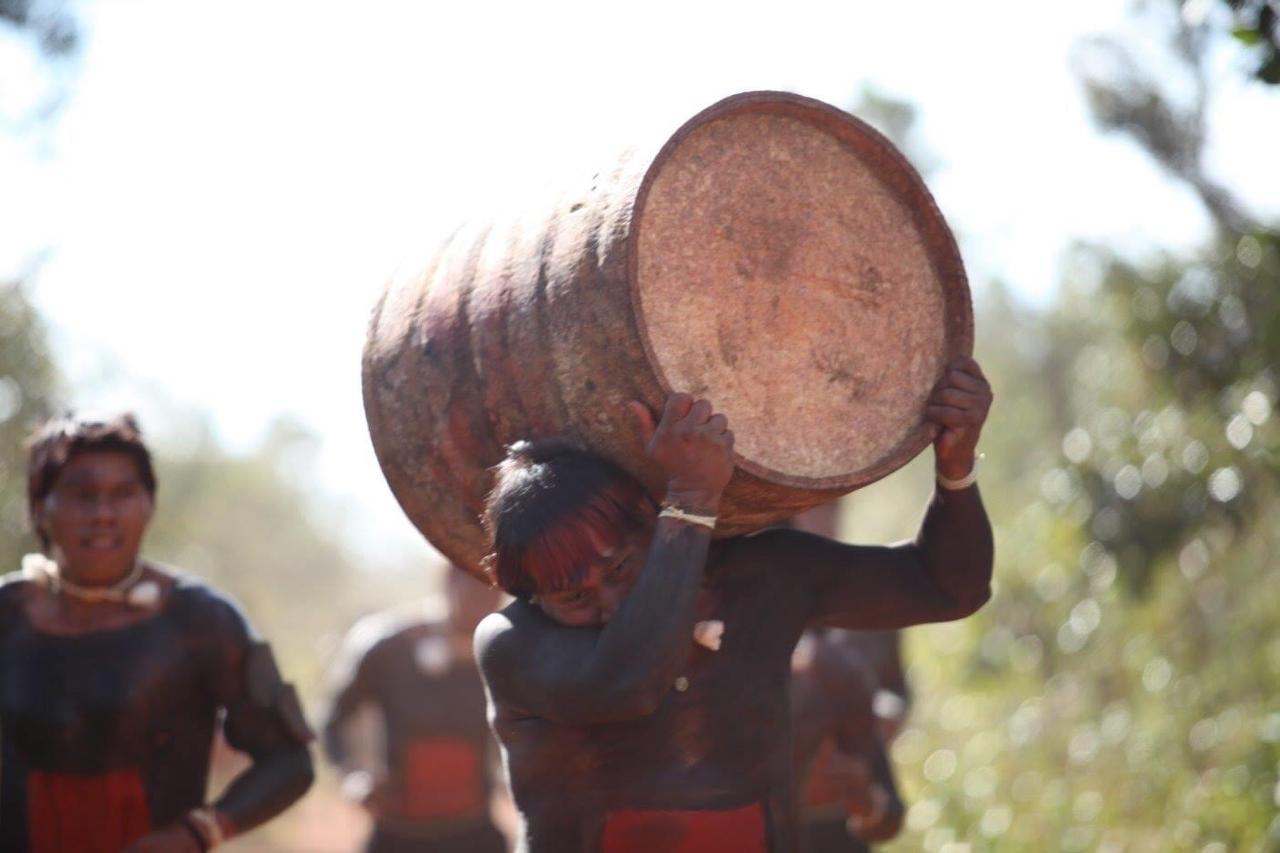
A’uwẽ-Xavante wish to practice their ceremonials, without fear of COVID exposure. Photo by A. C. F. Banavita.
The government of Jair Bolsonaro favors the interests of business, miners, land grabbers, local politicians, and representatives of the bancada ruralista in the National Congress (rural caucus) -- stakeholders who consistently violate Indigenous Peoples’ rights to Free, Prior and Informed Consent - over the interests and lives of Indigenous Peoples. Brazil’s Articulation of Indigenous Peoples (APIB), which brings together the nation’s Indigenous organizations, repudiates draft Bill 191 (Projeto de Lei 191) that President Jair Bolsonaro submitted to the National Congress on February 6, 2020. If it becomes law, this bill which President Bolsonaro described as his “dream,” would loosen restrictions on third party activities in Indigenous Territories and permit mineral, oil and gas exploration and extraction, as well as the implementation of large-scale infrastructure projects such as roads and hydroelectric dams. It would also allow intensive agricultural activities, thereby violating the 1988 Federal Constitution and ILO 169 which Brazil is party to since July 2002. "APIB, therefore, denounces the Bolsonaro Government’s manipulation of our right to autonomy and repudiates this death project that, at whatever cost, permits the implementation in Indigenous Territories of projects that will cause irreversible impacts, especially to isolated and recently contacted Indigenous Peoples.” On May 13, 2020, the President of Brazil’s Chamber of Deputies delayed consideration of this bill until the following week.
Another modification, Institutional Norm #9/2020, dated April 22, 2020 is particularly dangerous because it officially alters the administrative charge of FUNAI, the Brazilian equivalent of the U.S. Federal Bureau of Indian Affairs. The new norm aligns FUNAI and its work more closely with the Presidential agenda. The Norm undermines Indigenous Peoples’ constitutionally guaranteed rights to lands by permitting the government to refrain from granting legal title to Indigenous Territories that have not yet completed all of the many steps in the long and complicated administrative process of finalizing title (“homologizing”). Currently 237 Indigenous Territory cases, in various procedural stages of the titling process, are pending. During the Bolsonaro regime, the number of Indigenous Territories suffering illegal invasions has more than doubled. Invaders are involved in illegal activities such as mining, timber extraction, and the poaching and sale of wild animals. With fewer resources and less power and expertise than ever before, FUNAI now operates according to an economic-political agenda that has nothing to do with Indigenous rights and protection.
Draft Bill 191 and Institutional Norm #9/2020 are part of the “structured policy” that the government of Jair Bolsonaro is implementing to systematically undermine Indigenous rights and delay the demarcation of Indigenous lands. His strategy involves changing FUNAI’s administrative mandate, issuing requests for the re-analysis of territorial claims, eliminating resources and replacing key personnel who are responsible for studies that delimit Territories with individuals who are less capable. The Bolsonaro’ government’s policies are endangering the lives of Indigenous Peoples and exacerbating existing rural conflicts. FUNAI’s current president, Marcelo Augusto Xavier da Silva, its new officers - who are affiliated with the military and agribusiness - and the Director of the Isolated Peoples’ Program, Ricardo Lopes Dias, support President Bolsonaro’s agenda to evangelize, exploit and dismantle Constitutional protections for Brazil’s Indigenous Peoples. During the COVID-19 pandemic in which, according to APIB, 77 Indigenous Brazilians have died to date and 308 individuals from 34 distinct Indigenous groups have been infected, President Bolsonaro’s inflammatory rhetoric is stimulating invasions into Indigenous Territories and increasing violence against Brazil’s Indigenous Peoples. The president is making good on all of the anti-indigenous promises he made during his campaign, including his commitment to “not demarcate one more millimeter” of land for Indigenous Peoples. The Bolsonaro government is pressing rapidly ahead with its project to undermine Indigenous rights during the pandemic.
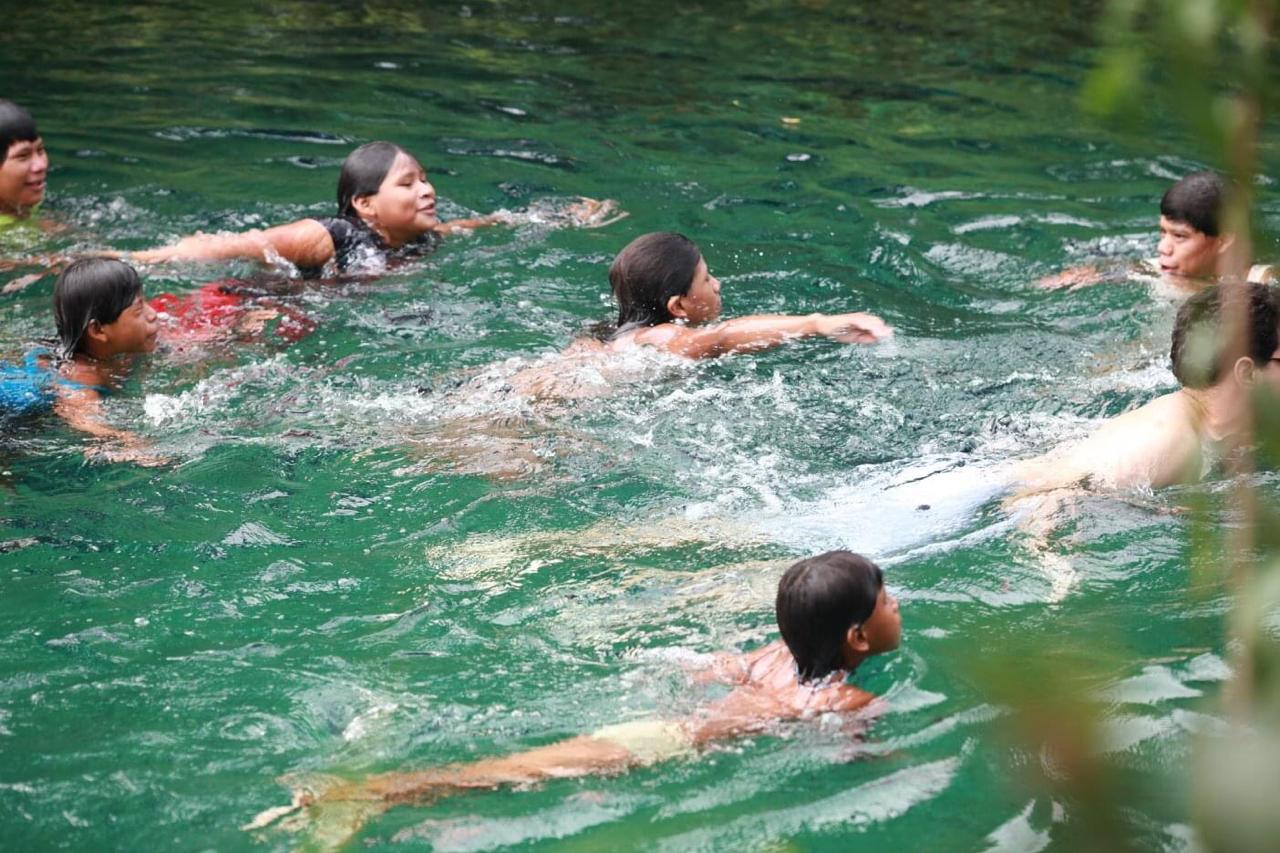 Boe-Bororo children visit and play in the river multiple times a day. The Rio das Mortes, now threatened by plans for three hydroelectric dams, is integral to the cultures and livelihoods of thousands of Indigenous peopls. Photo by A. C. F. Banavita.
Boe-Bororo children visit and play in the river multiple times a day. The Rio das Mortes, now threatened by plans for three hydroelectric dams, is integral to the cultures and livelihoods of thousands of Indigenous peopls. Photo by A. C. F. Banavita.
A’uwẽ-Xavante Motion Regarding Consultation Procedures in relation to Construction of Hydroelectrics on the Rio das Mortes Mato Grosso, Brazil
March 3, 2020, Barra do Garças, Mato Grosso
We – caciques, leaders and Associations from Xavante Indigenous Territories of São Marcos, Areões, Pimentel Barbosa and Sangradouro -- publicly denounce the manner in which discussions concerning three Small Hydroelectric Power Plants planned for construction on the Rio das Mortes are being handled by the firm Bom Futuro Energy. The three projects are: Cumbuco, Geologist Lucimar Gomes, and Entre Rios. Bom Futuro Energy exploits the Mato Grosso region, installing development projects adjacent to Indigenous lands.
From the outset, when Bom Futuro Energy first sought to present its project to Xavante, the company has endeavored to cause division among our people. Its meetings are spaces of co-option and the exclusion of opposing viewpoints. The documents produced based on these meetings do not express what actually happened at the meetings. The meeting minutes omit discussions that took place regarding the hydroelectric projects. The debates about the Free, Prior and Informed Consultation managed by the firm seek to manipulate this process within the community of Sangradouro.
The minutes from the first meeting, held on December 5, 2019, states that the company presented its project and spoke about the terms of Free, Prior and Informed consultation.
At that meeting, Mr. Norberto Tseredawa, secretary of the Warã Association, proposed to include Representatives from three additional Xavante Indigenous Territories - São Marcos, Areões and Pimentel Barbosa -- and also Bororo who inhabit the Indigenous Territory of Meruri, because the Rio das Mortes passes through these territories and is essential to the reproduction of our life and cultures. We understand the participation of these communities to be essential to the legitimacy of the consultation process. The meeting minutes indicate that "representatives were chosen" who have the capacity to deliberate the consultation’s procedures.
At the second meeting held in Primavera do Leste on January 27, 2020, those present decided that only the members of this Commission of representatives could participate [thereby limiting A’uwẽ-Xavante representation to those from Sangradouro who participated in the first meeting]. However, in addition to these members, other representatives who are in favor of the project were also present: representatives of the Pareci Association; Mr. Aguinaldo Santos, Superintendent for Indigenous Affairs for the State of Mato Grosso; and the President of the Rural Union of Primavera do Leste. In contrast, the participation of Mr. Felix A’uwẽ, Vice President of the Xavante Warã Association, was barred because he was not part of the first Commission. The inclusion of the members from the first Commission and prohibition against Felix’s participation favored the company’s position. Consensus in favor of the projects was being built into the formation of this Commission, which is responsible for carrying out the consultation process itself.
We defend the elaboration of the Consultation Protocol in which all A’uwẽ-Xavante people can decide and participate in Free, Prior and Informed Consultation because the Rio das Mortes is a sacred part of our territories and fundamental for the reproduction of our way of life. We are already concerned about what is happening on the Teles Pires River, where the Sinop hydroelectric plant was responsible for a large fish-kill in 2019 that continued into this year. We do not want the same thing to happen with our sacred river.
The document describing the scope and Plan of Work [Terms of Reference] issued by the National Indian Foundation (FUNAI) specifies that consultations will take place with Sangradouro Indigenous Territory thereby excluding all other Xavante and Bororo Indigenous Territories to be affected by these projects. This is legalistically rationalized based on an official decree defining 40 km as the area to be affected by the projects. This is a bureaucratic strategy to avoid consultations with our communities as a whole. This cannot be the starting point for the construction of our Consultation Protocol because we understand that an ensemble of Xavante Indigenous Territories must participate in the Consultation.
The minutes from the third meeting of this Committee, held on February 11, 2020, and self-titled “Grand Meeting for Prior Consultation” documents the presence of the entire staff of technical specialists from Bom Futuro Energy and MRS Consultants and their participation in debates. The minutes end by stating that the Xavante are not opposed to continuing the studies required for the execution of the Hydroelectric Plants and to the possibility that the company pay for and develop the Consultation Protocol.
The company’s presence in the development of the Xavante Consultation Protocol, is inacceptable. Even more unacceptable is the company’s money. We have the autonomy to decide! We assert that the Bororo Indigenous Territory of Meruri and the Xavante Indigenous Territories of Areões, São Marcos and Pimentel Barbosa, all to be affected by these hydroelectric projects, should also be part of the committee responsible for developing our Consultation Protocol.
Furthermore, representatives from the company, the Mato Grosso state Office of Indigenous Affairs, and technical specialists paid for by the company among others, must not be present in this Committee. We do not agree with the illegitimate manner in which this process is being managed. Those who defend hydroelectric plants are working to create divisions among Xavante. Our communities are being harassed by development companies who attempt to deepen divisions and exacerbate rivalries. The enemies of Indigenous Rights support this criminal activity.
The Consultation Protocol must be developed by A’uwẽ-Xavante in an independent autonomous and independent manner, without interference from those with interests in the hydroelectric power plants. These projects will create dependency, worsen our living conditions and have damaging effects on our culture. The Rio das Mortes is our sacred river. Its vitality is fundamental to our culture. We, A’uwẽ-Xavante, wish to build our Consultation Protocol in our own way, independently and according to our traditional organization, as recognized in ILO Convention 169. This is the only possible way to develop a consultation process that is valid for our people. Any other way is illegitimate.
Read ASSOCIAÇÃO XAVANTE WARÃ's letter requesting COVID assistance here.
Carta de ASSOCIAÇÃO XAVANTE WARÃ em português.
-- Laura R. Graham is an anthropologist at the University of Iowa. Edson Krenak Naknanuk is a Ph.D. student at the University of Vienna and Cultural Survival Consultant.
